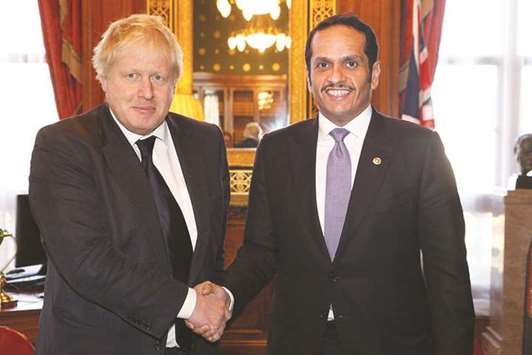Qatar is a strong partner in the fight against terrorism, a British minister said yesterday.
Alistair Burt, Minister of State for the Middle East at the Foreign and Commonwealth Office, said his government does not accept charges of supporting terrorism made against Qatar by some neighbouring states which have imposed a political and economic blockade on the country.
Burt was speaking to Al Jazeera on the sidelines of an anti-terror conference in London which was also addressed by Qatar’s Deputy Prime Minister and Foreign Minister HE Sheikh Mohamed bin Abdulrahman al-Thani.
Sheikh Mohamed said the root cause of Middle East terrorism lay in authoritarian rulers, and lack of human rights, adding Qatar was a reliable Western ally in the fight against terror.
The Foreign Minister stressed Qatar’s commitment to use political and economic policies, as well as security measures to attack extremism’s “breeding ground of injustice and authoritarianism”.
He accused Saudi Arabia of fracturing the region, adding “a pattern is emerging when they create a new crisis to cover up previous crises”.
Sheikh Mohamed said Saudi Arabia “had created a humanitarian catastrophe in Yemen, divided the Gulf states by attacking Qatar without an exit strategy and tried to pressurise the Lebanese prime minister to resign leaving a vacuum. Which policy of theirs has so far produced a positive result? It has all been counter-productive to stability in the region”.
Qatar has been locked in a bitter dispute for five months after Saudi Arabia, Egypt, Bahrain and the United Arab Emirates imposed a land, sea and air blockade, accusing Doha of harbouring and funding terrorist groups, charges it denies.
The Foreign Minister said the accusation was a pretext – designed to appeal to the West – to mount an attack on Qatar’s sovereignty and political outlook.
US, European and Kuwaiti efforts at mediation have not yet yielded the desired result, but so far Qatar’s economy has suffered little long-term damage.
Calling for an end to the instability in the Middle East, Sheikh Mohamed said: “Populations fall prey to extremist groups if rulers seek power, practice bad governance and strip populations of their human rights and dignity.
“Recent examples of the catastrophes created by evil ideologies can be found across my region: children who have lived through the mass atrocities of the Syrian regime, ISIS in Iraq and Syria, or the war in Yemen are now young adults with little hope for a better future.”
He said the risk was that such conflicts will breed a new generation of young extremists.
Next month Qatar will establish in co-operation with Britain an International Centre for Excellence in Countering Terrorism. Plans to announce the centre at yesterday’s conference were cancelled due to the need to finalise details, including whether it would be based in London, the Foreign Minister said.
The centre is expected to highlight not just security measures, but also how to counter the social and political breeding grounds for terrorism.
Sheikh Mohamed meanwhile met British Foreign Secretary Boris Johnson.
They discussed bilateral ties and ways to enhance them, in addition to developments in the GCC and the region and also other issues of joint interest.

HE Sheikh Mohamed bin Abdulrahman al-Thani meets British Foreign Secretary Boris Johnson.
